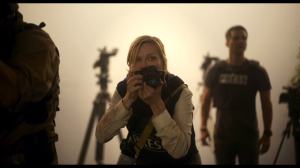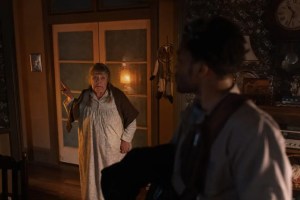Trouble at home. Films reviewed: Civil War, Sting, Housekeeping for Beginners
Hi, this is Daniel Garber at the Movies for culturalmining.com and CIUT 89.5 FM.
This week I’m looking a three interesting movies: from the US, North Macedonia, and Australia. There’s a carful of journalists heading to an apocalyptic Washington, a makeshift family in Skopje, and a carnivorous spider that fell from outer space.
 Civil War
Civil War
Wri/Dir: Alex Garland
It’s the near future in the United States, but these states are not united. The country is in the midst of a violent civil war, with a Texas- and California-based militia battling the federal government in an East vs West conflict. WF (Western Forces) vs the USA. The rebels are slowly advancing southward toward Washington DC.
Lee (Kirsten Dunst) a veteran war photographer is in New York, chasing a terror bombing alongside Joel a journalist (Wagner Moura). Lee has covered many wars at the frontline, but never one like this, on her home turf. Still, she and Joel want to cross the battlefront to get to DC and interview the president (Nick Offerman) ahead of the advancing rebel troops.
Sammy (Stephen McKinley Henderson), a grizzled newspaperman from way back, wants to hitch a ride as far as the Charlottesville front line. And greenhorn Jessie (Cailee Spaeny), straight out of school, says she idolizes Lee and her work. She caries a camera around her neck. Couldn’t she come too? Lee doesn’t mind mentoring young photographers, but not while she’s dodging bullets. In the end, all four of them begin their perilous in a 4WD.
It’s an apocalyptic journey, along broken highways filled with abandoned cars. Burnt out towns have snipers standing guard on roofs. Gas stations only take cash, preferably Canadian. Fear, hatred and the stench of rotting bodies floats in the air. Soldiers in camo, their hair dyed fluorescent colours casually brandish assault weapons. Accused collaborators hang from  rafters. Will their press passes be enough to save them from friendly fire? And who will enter the Whitehouse?
rafters. Will their press passes be enough to save them from friendly fire? And who will enter the Whitehouse?
Civil War is a Heart of Darkness plunge into an apocalyptic America where the enemy is ourselves. It’s thrilling, chilling, and quite disturbing. The theme is politics and war (and journalism), but you never quite find out what the two sides are fighting about, what they stand for, who’s right or who’s wrong. Rather, it’s about the hellish nature of war, and how conflict can destroy a country. Alex Garland (Ex Machina, Annihilation) made 28 Days Later, where an infection that leads to fast-moving zombies destroying the world. This has a similar feel but with a very different type of monster. And it will have you on the edge of your seat all the way through.
 Sting
Sting
Wri/Dir: Kiah Roache-Turner
It’s a cold winter night in a big, American city, where a record-breaking ice storm has trapped everyone in their homes. Charlotte (Alyla Browne), an intense, blonde Wednesday Addams, lives in a tenement with her mom, her cartoonist stepdad Ethan (Ryan Corr), and her infant brother. Ice storms are boring, but luckilly, Charlotte knows the building through and through. She easily crawls through vents to spy on other tenants: her sweet but demented Grandma (Noni Hazlehurst), her cruel great aunt Gunter (Robyn Nevin), the slumlord who owns the building; Maria, a sangria-guzzling alky with a yapping chihuahua, and Erik, a reclusive scientist. To keep herself occupied, Charlotte keeps a tiny spider she found in a glass jar. She names her Sting. But this is no ordinary spider. Sting can communicate with Charlotte, perfectly imitating her whistles. And Charlotte doesn’t know Sting is an intelligent alien that fell to earth inside a meteor.
As Sting voraciously consumes the bugs she feeds her, the spider rapidly grows in size and strength. Charlotte moves her into an aquarium, but even that won’t contain her. Like Charlotte, it can run through the vents, snatching, mummifying or scarfing up small animals on the spot. But when Charlotte notices people are disappearing, she realizes something is not right. She teams up with Ethan and a professional exterminator named Frank (Jermaine Fowler) to get Sting under control… but are they too late?
Sting is a ridiculously silly horror film about a man-eating alien insect who spins slimy webs and cocoons out of slimy mucous. Lots of fake blood and gore. At the same time, it always keeps a humorous tone, even in the scary and gross-out scenes. One interesting fact: Charlotte names her spider Sting after reading The Hobbit, but JRR Tolkien fans will notice Sting was actually the dagger Bilbo Baggins used to kill… a giant, man-eating spider! Another interesting fact: although it’s set in a snowy city like New York, Sting is an Australian movie, with an almost completely Aussie cast (including the delightful Noni Hazlehurst.)
Suffice it to say, Sting is an unabashedly B-movie that’s also a fun night out.
 Housekeeping for Beginners
Housekeeping for Beginners
Wri/Dir: Goran Stolevski
It’s present-day Northern Macedonia. Dita is an older woman who works at a social welfare office in Skopje. She’s descended from a prominent family in Tito’s Yugoslavia and shares a big house with a middle-aged man named Toni (Vladimir Tintor). Suada (Alina Serban) — a client from work — lives there too; she fled her abusive husband. Suada brought her two kids with her: tough, teenaged Vanessa (Mia Mustafi) and 6-year-old Mia (Dzada Selim). Today, there’s a new face in the house: 19 year old Ali (Samson Selim). He’s a sweet-talker who dyes his hair blond and is fond of green fingernail polish. He also knows everyone and everything happening in his neighbourhood. This means now there are two moms, one and a half dads, and a bunch of kids. The unusual thing is Dita and Suada are lovers, and Ali is Toni’s latest hookup. But that’s not all. Dita and Toni are ethnic Macedonians, while Ali, Suada and the kids all come from Shutka, a Muslim Romani neighbourhood. Dita’s house serves as an underground Mecca for outcastes, whether LGBT, Romani or both.
But everything changes when Suada is diagnosed with a fatal illness. She wants to make sure her kids are taken care of after she dies, and to give them a chance at success. The Roma are severely discriminated against, at school, work and even in accessing social services. If Rita and Toni adopt Mia, a bright and creative little girl, perhaps she can escape this endemic racism. But can a group of misfits live like a normal heterosexual family? Or is their experiment doomed for failure?
Housekeeping for Beginners is a sweet and realistic drama about the daily life of an unusual family and the tribulations they face. It’s also a real eye-opener! I never knew there are Muslim Romani communities, nevermind gay subcultures, within Northern Macedonia. It gives a glimpse into the street life of Shutka, and the complex social structures within that  neighbourhood. The acting is great, the characters they play are bold and fascinating. Apparently Samson Selim who plays Ali is the real-life father of Dzada Selim, the girl who plays Mia. It’s directed by Macedonian-Australian filmmaker Goran Stolevski, who spins amazing stories. This is the third movie I’ve seen by him (Reviews: Of an Age, You Won’t Be Alone) and even though his genres vary widely, he has a distinct style of storytelling, a bittersweet intimacy, which I’m liking more and more with each new film.
neighbourhood. The acting is great, the characters they play are bold and fascinating. Apparently Samson Selim who plays Ali is the real-life father of Dzada Selim, the girl who plays Mia. It’s directed by Macedonian-Australian filmmaker Goran Stolevski, who spins amazing stories. This is the third movie I’ve seen by him (Reviews: Of an Age, You Won’t Be Alone) and even though his genres vary widely, he has a distinct style of storytelling, a bittersweet intimacy, which I’m liking more and more with each new film.
This is a good movie.
Sting, Civil War and Housekeeping for Beginners all open this weekend in Toronto: check your local listings.
This is Daniel Garber at the Movies, each Saturday morning, on CIUT 89.5 FM and on my website culturalmining.com.
Three Women. Films reviewed: Immaculate, Exhuma, The Queen of my Dreams
Hi, this is Daniel Garber at the Movies for culturalmining.com and CIUT 89.5 FM.
This week, I’m looking at three new movies about three distinct women from three different religions. There’s a nun fighting for her life in Italy, a shaman fighting demons in Korea, and a Canadian woman fighting with her Mom in Karachi.
 Immaculate
Immaculate
Dir: Michael Mohan
Sister Cecilia (Sydney Sweeney) is a novice at a convent in Italy. It’s an ancient edifice dating back hundreds of years, with an airy courtyard surrounded by lovely white pillars, and situated amongst Italy’s rolling hills. She has just arrived from Michigan, but is already taking her vows of chastity, poverty and obedience. She was invited to join the convent by Father Sal Tedeschi (Álvaro Morte) a former scientist who, like Cecilia, had a calling. Her job? To tend to the sick and dying, mainly older nuns who have lived their entire lives within their stone walls. There is little privacy there, especially for novices. Anyone can wander into their rooms, day or night.
But something strange is going on. When she touches a relic of the true cross, she faints. She wakes up days later with few memories of what happened. She goes to confession but her priest seems to fade away inside the booth. And one morning she throws up in the shared baths. Could that be morning sickness? Could she be pregnant? Bishops and doctors examine her closely: she is still a virgin. Which makes this an immaculate conception! It’s a miracle! It’s the second coming! Soon people are gazing at her in awe, reaching out to touch her face. But this is not why Cecilia took her vows. She doesn’t trust the convent’s doctor — who just happens to be an obstetrician in a convent full of nuns. And then there are the frightening sisters who cover their faces in masques of red gauze to carry out enforcement. When her only friend, Sister Gwen (Benedetta Porcaroli) disappears, Cecilia realizes she has get out of this place — or this nun will be done. But how can she escape?
her face. But this is not why Cecilia took her vows. She doesn’t trust the convent’s doctor — who just happens to be an obstetrician in a convent full of nuns. And then there are the frightening sisters who cover their faces in masques of red gauze to carry out enforcement. When her only friend, Sister Gwen (Benedetta Porcaroli) disappears, Cecilia realizes she has get out of this place — or this nun will be done. But how can she escape?
Immaculate is a thriller/horror about an innocent young woman trapped in an Italian house of by some religious fanatics. But for a movie about a nunnery there sure are a lot of breasts on display… draped in damp white diaphanous gowns in the baths or partly exposed late at night. That’s half of this exploitation movie: soft-core porn. The other half, though, is extreme, bloody violence and sadistic torture — what I call “gorno”: Disgusting, extended violence you’re forced to watch for its titillating effect. This leaves the movie both ridiculous and over the top, and more gross than scary, in the manner of an Italian Giallo movie from the 70s… but without any camp.
That said, I actually liked Sydney Sweeney as the innocent woman who fights back. And while this is clearly a B movie, it does end on a suitably shocking note.
 Exhuma
Exhuma
Wri/Dir: Jang Jae-hyun
Hwarim (Kim Go-eun) is a young Korean woman on a Japanese flight to LA. She’s going there to investigate a client from a filthy-rich Korean family that suffers from strange dreams and illnesses. Not just the man himself, but his new born baby, and other relatives. She’s a shaman, travelling with her coworker Bong-Gil a heavily-tattooed, former baseball player (Lee Do-hyun) who can see visions and dreams. They determine evil forces are at work here, and call for an exhumation of a distant ancestor’s grave to rectify some unknown problem. The family agrees and pays them a hefty salary to make it work. Back in Korea, they turn to Kim a geomancer (Choi Min-sik) and his assistant. He knows about how Yin and Yang, Feng Shui and the Five Elements all must be correctly aligned to make for a peaceful grave. But the grave they find is anything but peaceful. The coffin is buried beneath an unmarked tombstone, on a distant hilltop near North Korea, reachable only through a chain-locked road where no one ever goes. It’s home to a skulk of foxes and a pit of snakes. And despite their lengthy shamanic  rituals, somehow an ancient evil spirit escapes from the grave wreaking havoc on everyone nearby. It’s not just a ghost that says “boo”; it takes on a physical form, looking for humans as his slaves, to feed him sweet melons and mincemeat. And woe be to him or her who disobeys. Human livers taste just as good. Can these four brave souls defeat a dark evil from a rich family’s hidden past?
rituals, somehow an ancient evil spirit escapes from the grave wreaking havoc on everyone nearby. It’s not just a ghost that says “boo”; it takes on a physical form, looking for humans as his slaves, to feed him sweet melons and mincemeat. And woe be to him or her who disobeys. Human livers taste just as good. Can these four brave souls defeat a dark evil from a rich family’s hidden past?
Exhuma is a supernatural horror/thriller about a fight against the deep, dark mysteries from Korea’s history (including references to their brutal occupation under Imperial Japan). The film is done in an interesting way, incorporating actual shamanic rituals into the story. In one scene, to the sound of pounding drums, Hwarim does an extended ecstatic dance around the bodies of four hogs impaled on skewers. Not the sort of thing you usually see in a horror movie.
Exhuma was a huge hit in Korea when it was released there a month ago, and I’m not at all surprised.
I like this one.
 The Queen of My Dreams
The Queen of My Dreams
Wri/Dir: Fawzia Mirza
It’s 1999 in Toronto. Azra (Amrit Kaur) is an aspiring actress with a steady girlfriend. She has been on bad terms with her mother Mariam (Nimra Bucha: Polite Society) since she was caught playing spin the bottle with a girl at her teenage birthday party. But she still communicates with her friendly Dad (Hamza Haq: Transplant) a doctor. The one thing Azra has in common with her mother is their obsession with an old Bollywood movie starring Sharmila Tagore. But when her Dad suddenly dies on a visit to Karachi, Pakistan, Azra and her brother must fly there for the funeral. This sets off a series of revealing memories both from Azra and Mariam. Suddenly we’re  transported back to 1969, when Mariam is a totally different person and Karachi a swinging city, filled with bars, discos, VW bugs and Beatlemania.
transported back to 1969, when Mariam is a totally different person and Karachi a swinging city, filled with bars, discos, VW bugs and Beatlemania.
Mariam is a rebel who rejects her parents’ arranged marriages when she falls for her future husband. Then we’re in Sydney, Nova Scotia, in 1989. Young Azra (wonderfully played by Ayana Manji) joins her mom’s work as a Tupperware lady. These scenes are a coming of age replete with a moustache on her upper lip, her first dance with a boy, and being excused from class during Christian prayers. But can the 1999 mother and daughter reconcile with their pasts in 1989 Nova Scotia and 1969 Karachi and learn to love each other again?
 The Queen of my Dreams is a wonderful family drama that deftly weaves three eras and three generations across two continents. It deals with religion and sexuality, rules that are made to be broken and others that are upheld. I don’t know if this film is autobiographical or not, but it really rings true. Amrit Kaur plays both the adult Azra and a younger version of Mariam, while Hamza Haq plays the Dad both in youth and middle age. Not just that: Nimra Bucha (Mariam) and Kaur in their daydreams are both transformed into the main character in their favourite Bollywood film. Sounds really complicated, right? It’s not! It’s totally accessible and understandable with wonderful realistic characters, funny lines and deeply moving dialogue. The production design deserves a special mention. The ’60s scenes use traditional film to perfectly capture the look of Kodacolor movies from the period, through costumes, hair, locations, cars — and especially its cinematography. And on top of everything else, this is Fawzia Mirza first feature film.
The Queen of my Dreams is a wonderful family drama that deftly weaves three eras and three generations across two continents. It deals with religion and sexuality, rules that are made to be broken and others that are upheld. I don’t know if this film is autobiographical or not, but it really rings true. Amrit Kaur plays both the adult Azra and a younger version of Mariam, while Hamza Haq plays the Dad both in youth and middle age. Not just that: Nimra Bucha (Mariam) and Kaur in their daydreams are both transformed into the main character in their favourite Bollywood film. Sounds really complicated, right? It’s not! It’s totally accessible and understandable with wonderful realistic characters, funny lines and deeply moving dialogue. The production design deserves a special mention. The ’60s scenes use traditional film to perfectly capture the look of Kodacolor movies from the period, through costumes, hair, locations, cars — and especially its cinematography. And on top of everything else, this is Fawzia Mirza first feature film.
I’ve seen The Queen of my Dreams twice now and I still love it.
Exhuma opens at the TIFF Lightnox; Immaculate, and The Queen of My Dreams also playing this weekend in Toronto; check your local listings.
This is Daniel Garber at the Movies, each Saturday morning, on CIUT 89.5 FM and on my website culturalmining.com.
Summer entertainment. Films reviewed: Three Thousand Years of Longing, Alienoid, The Good Boss
Hi, this is Daniel Garber at the Movies for culturalmining.com and CIUT 89.5 FM.
This week I’m talking about three entertaining summer movies from around the world. There’s a British academic who meets a djinn in Istanbul; an ambitious businessman forced to “weigh his options” in Spain; and some alien, time-travelling prison guards trying to catch mutant convicts in medieval Korea.
 Three Thousand Years of Longing
Three Thousand Years of Longing
Co-Wri/ Dir: George Miller (Based on the short story by A.S. Byatt)
Dr Alithia Binney (Tilda Swinton) is a British academic in Istanbul for a conference. She’s a narratologist, someone who studies the structure of stories and how they’re told. She’s been obsessed by stories since she was a kid, when she even had an imaginary friend. She’s still more comfortable reading than talking to other people. But these imaginary friends seem to be reappearing more often lately. A small man in a lambskin coat talks to her in the airport — but no one else sees him. And when giving a lecture a strange man in Mesopotamian garb appears in the audience. But she really  starts to worry when one of them doesn’t go away. This all started when a glass bottle she found in an Istanbul antique store let loose a gigantic genie (Idris Elba) — or Djinn as he calls himself. To no one’s — surprise since we all know this narrative structure — he grants her three wishes. But to the Djinn’s shock she says she doesn’t want anything. She’s content with what she has, and besides, these sort of stories always go wrong in the end. So the Djinn tells her his 3000-year-long story instead, and what will happen if she doesn’t use those wishes. And an amazing tale it is, with characters like Solomon and Sheba, and the sultans of Ottoman Arabia. There’s a sluggish prince locked in a fur-lined chamber with a dozen huge-breasted Rubenesque consorts. And a woman genius in the Renaissance who just wants to study. Like a story within a story, these talks are told by the
starts to worry when one of them doesn’t go away. This all started when a glass bottle she found in an Istanbul antique store let loose a gigantic genie (Idris Elba) — or Djinn as he calls himself. To no one’s — surprise since we all know this narrative structure — he grants her three wishes. But to the Djinn’s shock she says she doesn’t want anything. She’s content with what she has, and besides, these sort of stories always go wrong in the end. So the Djinn tells her his 3000-year-long story instead, and what will happen if she doesn’t use those wishes. And an amazing tale it is, with characters like Solomon and Sheba, and the sultans of Ottoman Arabia. There’s a sluggish prince locked in a fur-lined chamber with a dozen huge-breasted Rubenesque consorts. And a woman genius in the Renaissance who just wants to study. Like a story within a story, these talks are told by the  djinn as they both sit in her hotel room, dressed in white terrycloth robes and towel turbans. Is this all in her mind, or is it real? And if so, what will her wishes be?
djinn as they both sit in her hotel room, dressed in white terrycloth robes and towel turbans. Is this all in her mind, or is it real? And if so, what will her wishes be?
Three Thousand Years of Longing is the retelling of stories within stories, in the style of The Thousand and One Nights, but told from a contemporary perspective. These are framed by Alithia’s own stories, and contemporary events. George Miller, of Mad Max fame, directed this, and spares no special effects — there is a mind-boggling plethora of CGIs in every scene: with non-stop, lush magical images. Idris Elba is fun as the Djinn with his pointy ears and the blue-green scales on his legs; and Tilda Swinton is great as always, this time bedecked in rose-coloured skirts, with a red pageboy haircut and academic glasses. Nothing deep here and it’s not terribly moving, but I always love a good story, well-told.
Wri/Dir: Choi Dong-hoon
It’s Korea six centuries ago, when a metal object tears through the sky, killing a woman with its tentacles. But, believe it or not, the tentacles are from the good guys, and the medieval Korean woman is actually an escaped mutant killer from another planet. You see, Guard (KIM Woo-bin) and Thunder are alien prison guards who lock the mutant prisoners inside human brains… and if they try to escape, earth’s atmosphere will kill them in a few minutes. But the humans with the alien prisoners locked inside them have no idea.
The woman they killed has a newborn baby girl, so they take her with them back to 2022 and raise her like she’s their own child (yes, little Ean has two daddies!) But they’re neither human nor mutants — Guard is a sophisticated robot and  Thunder is a computer program, but they both can take on human form. Now in 2022 things are going bad. Alien mutants have arrived on earth to free the prisoners and turn the earth’s air toxic for humans but breathable by them. And they’re winning the battle.
Thunder is a computer program, but they both can take on human form. Now in 2022 things are going bad. Alien mutants have arrived on earth to free the prisoners and turn the earth’s air toxic for humans but breathable by them. And they’re winning the battle.
But back to 600 years ago, things aren’t as bad. Muruk (RYU Jun-yeol) is a young Dosa, or spell caster, who earns his living as a bounty hunter. Now he’s after something more valuable — a legendary crystal knife called the divine blade for its strange powers. He tracks it down to a wedding and impersonates the  groom to steal it. What he doesn’t know is his “bride” is also an imposter seeking the same prize. So are Madame Blue and Mr Black, veteran sorcerers who make their living selling magic trinkets, as well as some evil killers, one of which dresses like a man from 2022. Who are all these people? What’s going on here? Will the world be destroyed? And what’s the connection between then and now?
groom to steal it. What he doesn’t know is his “bride” is also an imposter seeking the same prize. So are Madame Blue and Mr Black, veteran sorcerers who make their living selling magic trinkets, as well as some evil killers, one of which dresses like a man from 2022. Who are all these people? What’s going on here? Will the world be destroyed? And what’s the connection between then and now?
Alienoid is a Korean movie about science fiction time travel that spans all genres. It’s part action, superhero, fantasy, romance, drama, and comedy. It deftly incorporates the time-travelling robots from Terminator; HK style airborne fighting, and the funny, soapy characters of Korean historical TV dramas all pulled together in a way I’ve never quite seen before. It has a  huge budget — 33 billion won — but it’s not a superhero movie. That’s another great thing about Alienoid: unlike superheroes, all the main characters may have some special powers but they also have major flaws: they mess up a lot, lie, cheat, steal, and behave like grifters. One warning (not a spoiler) the movie finishes, but it doesn’t end, with the next sequel coming out next year. So if you’re looking for a highly entertaining two hours, you can’t go wrong with Alienoid.
huge budget — 33 billion won — but it’s not a superhero movie. That’s another great thing about Alienoid: unlike superheroes, all the main characters may have some special powers but they also have major flaws: they mess up a lot, lie, cheat, steal, and behave like grifters. One warning (not a spoiler) the movie finishes, but it doesn’t end, with the next sequel coming out next year. So if you’re looking for a highly entertaining two hours, you can’t go wrong with Alienoid.
Dir: Fernando León de Aranoa
Julio Blanco (Javier Bardem) is the owner of Blanco Scales, a factory in a small Spanish town — he inherited the company from his Dad. They make everything from bathroom scales to enormous steel balances that can weigh a whole cow. He knows he’s a successful businessman and a good boss by the way his smiling employees applaud him whenever he makes a speech. They’re like his children, he says beneficently, and when they have a problem, he has a problem — his door is always open to help them out. Then there’s his industry trophy wall, directly across from his marital bed, that recognizes him for his business accomplishments. There’s just one prize he hasn’t won yet, the official regional award, which could open huge doors in government contracts. He’s one of three nominees and he really wants to win it.. All he has to do is make everything run perfectly and all his employees content within one week — that’s when the inspectors are coming.
The problem is, not everything is as perfect as he imagines.  Production is weeks behind schedule, because Miralles — whom he’s known since childhood — is not paying attention. He’s too busy stalking his wife who he thinks is cheating on him. Won’t Blanco help him catch her in flagrante delecto? Jose, a laid-off employee, doesn’t want to leave; he’s camped out in front of the factory demanding to be rehired. And long-time mechanic Fortuna’s son has been arrested for assaulting strangers in the park — won’t Blanco behave like a role model and get the kid a job somewhere? And then there’s problems of his own creation: he’s flirting with a beautiful new intern, Liliana (Almudena Amor) who seems equally attracted to him. She even has the scales of Libra tattooed on her neck. Little does Blanco know, she’s the daughter of his wife’s best friend, the same one he coddled as an infant. Can he solve all his company’s problems in just one week? Or is he just digging deeper into a hole?
Production is weeks behind schedule, because Miralles — whom he’s known since childhood — is not paying attention. He’s too busy stalking his wife who he thinks is cheating on him. Won’t Blanco help him catch her in flagrante delecto? Jose, a laid-off employee, doesn’t want to leave; he’s camped out in front of the factory demanding to be rehired. And long-time mechanic Fortuna’s son has been arrested for assaulting strangers in the park — won’t Blanco behave like a role model and get the kid a job somewhere? And then there’s problems of his own creation: he’s flirting with a beautiful new intern, Liliana (Almudena Amor) who seems equally attracted to him. She even has the scales of Libra tattooed on her neck. Little does Blanco know, she’s the daughter of his wife’s best friend, the same one he coddled as an infant. Can he solve all his company’s problems in just one week? Or is he just digging deeper into a hole?
 The Good Boss is a biting social satire dealing with class, race, and gender in contemporary Spain. Javier Bardem is terrific as the smarmy Blanco, a big fish in a small pond who loves his glassed-in office where he can lord over all the little people beneath him. A comedy, it’s full of every possible pun about scales — the blind justice statue, the Libra sign, tipping the scales… to name just a few. And though a light comedy, it looks at very dark issues with a jaundiced eye.
The Good Boss is a biting social satire dealing with class, race, and gender in contemporary Spain. Javier Bardem is terrific as the smarmy Blanco, a big fish in a small pond who loves his glassed-in office where he can lord over all the little people beneath him. A comedy, it’s full of every possible pun about scales — the blind justice statue, the Libra sign, tipping the scales… to name just a few. And though a light comedy, it looks at very dark issues with a jaundiced eye.
I enjoyed this one, too.
Three Thousand Years of Longing and Alienoid both open this weekend across North America; check your local listings; and you can catch The Good Boss now at the TIFF Bell Lightbox in Toronto.
This is Daniel Garber at the Movies, each Saturday morning, on CIUT 89.5 FM and on my website, culturalmining.com
The Twentieth Century. Films reviewed: Escape from Mogadishu, When Hitler Stole Pink Rabbit, 12 Mighty Orphans
Hi, this is Daniel Garber at the Movies for culturalmining.com and CIUT 89.5 FM.
Some movies have titles that tell you a lot about what you’re going to see. This week I’m looking at three such movies, all set during the 20th century. We’ve got Koreans in Mogadishu in the 1990s; child refugees from Nazi Germany in the early 30s; and Texan orphans playing football in the Great Depression.
Dir: Seung-wan Ryoo
It’s 1990 in Mogadishu Somalia, and the country is on the verge of collapse. Its authoritarian President Barre is still in power but rebel forces are gaining strength. It’s also the year when both North and South Korea are joining the United Nations, and are in heavy cold-war competition to build up more allies than their rival in vote-rich Africa. And the two ambassadors, Ambassador Han from the south (Kim Yoon-seok) and Ambassador Rim (Heo Joon-ho) from the north are in constant competition to curry favour with Barre’s government. And they each have heavy-hitters to help them. Kang (In-Sung Jo) is a recent arrival from the notorious Korean CIA. He’s arrogant and rude, but effective. Likewise, his counterpart from the north. They each run underhanded schemes against the other side, from planting fake news reports, to hiring thugs to steal embassy materials. But the Somali government is losing its grip, and there’s mayhem on the streets. And when all communications cease, both sides realize they  have to get the hell out of Mogadishu. And due to strange circumstances, the North and the South are forced to cooperate, and try to escape together.
have to get the hell out of Mogadishu. And due to strange circumstances, the North and the South are forced to cooperate, and try to escape together.
But will it work?
Escape from Mogadishu is a Korean action/thriller set in a Somalia teetering on the brink of civil war. There are child soldiers shooting rifles at random, corrupt police, and mobs of looters running rampant. Both North and South Koreans loathe their rivals — the countries are technically still at war, with a 40-year-old ceasefire at their shared border. When they encounter each other face-to-face, the ROKs thinks the DPRKs are trained as killers since they  were kids; while they’re sure the South Koreans are either trying to poison them or force them to defect. And neither country can let it be known they’re doing anything that might help the other side.
were kids; while they’re sure the South Koreans are either trying to poison them or force them to defect. And neither country can let it be known they’re doing anything that might help the other side.
This is a fun movie about rivals caught in an apocalypse. It includes an amazing, 30-minute chase scene as they try to escape. It’s set in Somalia (and shot in Morocco) but it’s really about Koreans — rivalry, suspicion, with the underlying hope of brotherhood and peace. The Somalis are there as decoration, mainly portrayed as corrupt, violent, crazy, untrustworthy, or else as silent, nameless victims — typical of most war movies. The Korean characters are more rounded but not always favourable either. Escape from Mogadishu has a hardboiled, cynical tone, but with a great streak of ironic humour and an underlying message of good will. This movie was just released in South Korea and it’s the years first blockbuster. So if you like action thrillers, you should check this one out.
Co-WriDir: Caroline Link
It’s 1933 in Berlin. The Kempers are an upper middle class family living in a nice neighbourhood. Dad (Oliver Masucci) is a leading theatre critic, also known for his radio broadcasts. Mom (Carla Juri) is a pianist. Their son, Max (Marinus Hohmann) is into Zorro, while little Anna (Riva Krymalowski) likes drawing pictures of animals at the zoo. And they all adore their housekeeper Heimpi. But with elections a week away, and Hitler’s Nazis likely to prevail, Dad is worried. As a committed socialist and an unsparing critic, he’s prominent on Hitler’s enemy list. If the Nazis win he will likely be jailed or killed. So the family packs up a few suitcases for a quick trip to Switzerland. They plan to come back after the election. No such luck. Hitler triumphs, and they’re stranded in  Zurich. The government seizes all his possessions and furniture, brown shirts burn his books, and newspapers stop publishing his work. Suddenly they are refugees, and Jewish intellectuals, no less, an exceedingly unpopular category.
Zurich. The government seizes all his possessions and furniture, brown shirts burn his books, and newspapers stop publishing his work. Suddenly they are refugees, and Jewish intellectuals, no less, an exceedingly unpopular category.
So they settle into country life in a tiny alpen village near lake Zurich. Anna is baffled by the strange accent, their melted cheese and odd customs. Girls are separated from boys and kept at the back of the classroom, and boys throw rocks at girls they like. She soon adjusts and makes local friends. But their parents must keep a low profile. Dad is a wanted man, with a price on his head, and Nazi sympathizers are everywhere. Eventually they movie to Paris, where antisemitism is rife. As they sink deeper into poverty, they are forced to  choose between necessities (like food, pencils and lightbulbs) and luxuries (like books and meat). Will the tide ever turn in their favour?
choose between necessities (like food, pencils and lightbulbs) and luxuries (like books and meat). Will the tide ever turn in their favour?
When Hitler Stole Pink Rabbit is a realistic and poignant story about a young girl’s life as a refugee in the 1930s. It’s about the whole family but seen through Anna’s eyes. It’s also about her internal trauma — her drawings turn from cute animals to people drowning in the ocean or crushed in an avalanche. It’s based on the semi-autobiographical novel by the late British author and illustrator Judith Kerr. So, as a film, it’s not the kind that builds to big climax and denouement; rather it’s episodic storytelling, a collection of vivid memories taken from the author’s childhood. The movie is filled with the wonder and disillusionment of a girl growing up in an unkind world, but it never loses its optimism.
This is a very nice and engrossing film.
Dir: Ty Roberts
It’s the 1938 in the Texas panhandle dustbowl, where starving farmers are abandoning their land and their children. Rusty Russel (Luke Wilson) is a renowned high school football coach starting a new job. He has taken many teams statewide championships. But his newest school is an exception. The kids here are barefoot, undernourished and illiterate. And they’re all orphans. But the coach is determined to change all that. So he tries to put together a football team, the school’s first, from among the orphans. They’re regularly flogged by Frank Wynne (Wayne Knight) who runs a for-profit printing press on school grounds and who treats the kids as virtual slaves. Rusty offers an  enticement — when you’re training on the football field, you won’t be working on the fields.
enticement — when you’re training on the football field, you won’t be working on the fields.
Rusty pulls together a ramshackle bunch of scrawny, gap-toothed kids with low-esteem. And a newcomer, Hardy Brown (Jake Austin Walker) a 17-year-old seething with anger. With the help of the school’s medic, the kindly alcoholic Doc Hall (Martin Sheen), they manage to get the boys to resemble something like a team. Through pep-talks, motivation and intensive training, they’re ready to play ball — but against whom? The other schools want nothing to do with them. And they’re so much smaller than the average football player they don’t stand a chance even if they do play. But the Mighty  Mites persevere, and make it into the league. But can they ever win? And will they learn to call themselves orphans with pride not shame?
Mites persevere, and make it into the league. But can they ever win? And will they learn to call themselves orphans with pride not shame?
12 Mighty Orphans is a wonderful, heartwarming sports movie about a team of underdogs trying to make it. I have no interest whatsoever in high school football, and yet I found this movie captivating. It’s a traditional-style movie — it could have been made in the 1940s — but still feels fresh. Each kid has his own personality, with names like Snoggs (Jacob Lofland), Fairbanks, Wheatie, and Pickett — all based on actual players. With clear-cut villains, and bittersweet heroes, it’s simple and easy to follow but moving, nonetheless.
This is a good one.
When Hitler Stole Pink Rabbit is now available on VOD and other digital formats. 12 Mighty Orphans and Escape from Mogadishu both open theatrically in Toronto this weekend — check your local listings.
This is Daniel Garber at the Movies, each Saturday morning, on CIUT 89.5 FM and on my website, culturalmining.com







leave a comment